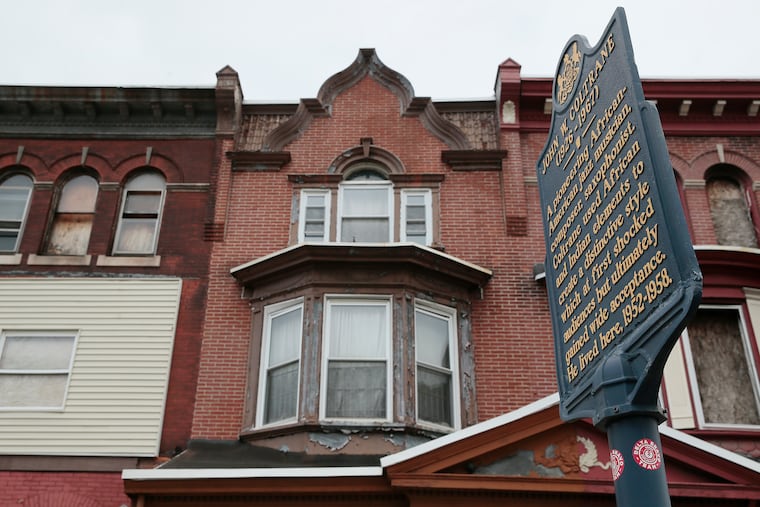Philadelphia’s John Coltrane House may be saved from demolition
Funds from a $5.2 million grant for Black descendants of historic properties nationwide will be set aside to preserve the jazz great’s home and clarify ownership

Could there finally be salvation for Philadelphia’s John Coltrane House in Strawberry Mansion?
For years, community activists and jazz lovers have been talking about restoring the house that the legendary jazz saxophonist John Coltrane bought in 1952, and turning it into a museum. The property is now vacant, with crumbling front steps, holes in the exterior walls, and an interior in need of extensive repairs.
There has been little money to renovate Coltrane’s house, at 1511 N. 33rd St., across from Fairmount Park, and fires and demolitions of nearby houses have threatened the entire block.
This week, the African American Cultural Heritage Action Fund, a project of the National Trust for Historic Preservation, and the Andrew W. Mellon Foundation announced that they have teamed up to pledge $5.2 million to a new initiative aimed at preserving homes important to Black history.
They also announced that Coltrane’s Philadelphia house, a National Historic Landmark, will be the first recipient of the new Descendants and Family Stewardship Initiative. However, there was no immediate word on how much of that $5.2 million is going to the Coltrane House.
“We are very excited about the partnership,” Brent Leggs, executive director of the action fund, said Thursday in a brief message to The Inquirer.
The New York Times, in an article on Tuesday, quoted Ravi Coltrane, one of Coltrane’s sons, who also plays the saxophone and lives in Brooklyn, saying:
“These funds are very vital and very much needed for any repairs and restorations. We certainly hope within the next few years to completely stabilize the home and foundation.
“We are all on board with the mission of opening the house to the public and having it there in the community as something symbolic of what John Coltrane was able to do there, which is to be a beacon for the highest possibilities of creative achievement.”
Coltrane is said to have lived in the house, where he composed the album, Giant Steps, between 1952 and 1958, but often visited there until his death in 1967.
Legal battle for the Coltrane House
The announcement of the new grant also included news that the African American Cultural Action Fund will transfer ownership of the Philadelphia Coltrane house to the Friends of the John and Alice Coltrane Home, a nonprofit that manages the home that Coltrane and his wife Alice owned together in Dix Hills, N.Y., on Long Island, a news release stated.
In April 2022, Ravi Coltrane and his brother, Oran Coltrane, filed a lawsuit in Philadelphia Common Pleas Court against Aminta Weldon and Hathor Gadson, challenging the ownership of the Philadelphia house.
» READ MORE: John Coltrane’s sons file suit to claim ownership of Philly’s Coltrane House
Current records list the two sisters, the daughters of the late real estate investor Norman Gadson and his wife, Lenora S. Early, as owners of the property.
However, the lawsuit contended that the Coltrane brothers are the rightful owners of the property.
After John Coltrane bought the house in 1952, he put it in the name of his mother, Alice Gertrude Coltrane — not to be confused with Coltrane’s second wife, Alice Lucille Coltrane, whom he married in 1966.
John Coltrane bought the house as a home for himself, his mother and his cousin, Mary L. Alexander, also known as “Cousin Mary,” from the Coltrane composition.
The lawsuit said that Coltrane’s mother had a valid will that stipulated that “Cousin Mary” could live in the house on 33rd Street for the remainder of her life and that the house would then belong to Coltrane’s three sons. One son died at a young age, leaving just two sons living now, Ravi and Oran.
The lawsuit said that in 2004, Norman Gadson, a real estate investor, bought the house from Alexander. After Gadson died in 2007, his wife, Lenora Early, took over efforts to bring attention to the need to restore the house. But Early also died, leaving Aminta Gadson Weldon as administrator of the estates of Norman Gadson and Early.
In May 2023, a tentative settlement was reached to restore ownership to the Coltrane brothers, upon condition of a financial settlement to be paid by a third party.
In the announcement this week, the action fund said it would help resolve the lawsuit and transfer ownership to the nonprofit Friends of the John and Alice Coltrane Home, which his sons manage.
Faye Anderson, a public historian who has advocated for the preservation of the Coltrane House and nominated it to the Preservation Pennsylvania “At Risk” list in 2020, said the grant was “wonderful news” and she is glad there is renewed attention to the deteriorating property.
In an interview Thursday, Anderson said the news of the funding is positive. But she said it will take millions to not only renovate the Coltrane House, but to also make it into a museum.
“Four years later, the National Historic Landmark is the first site selected for the African American Cultural Heritage Action Fund’s families and descendant communities initiative. It will take millions of dollars before the property is open to the public but my work is done,” she said in a statement. “Mission accomplished.”